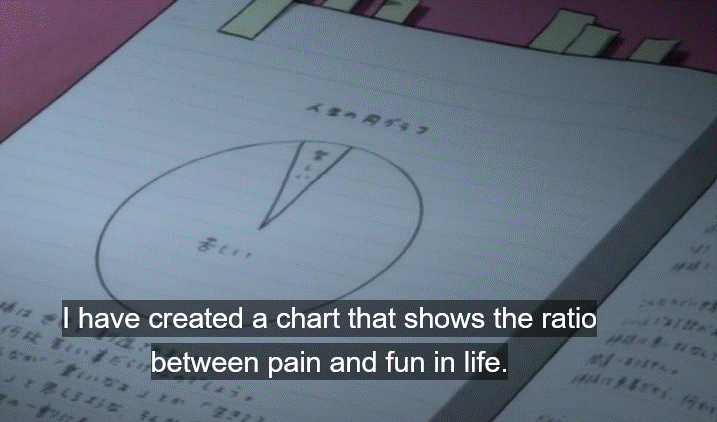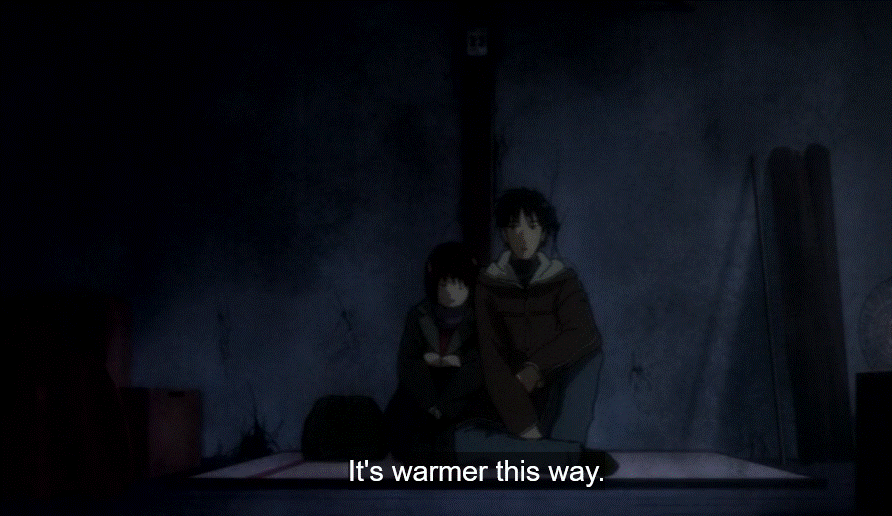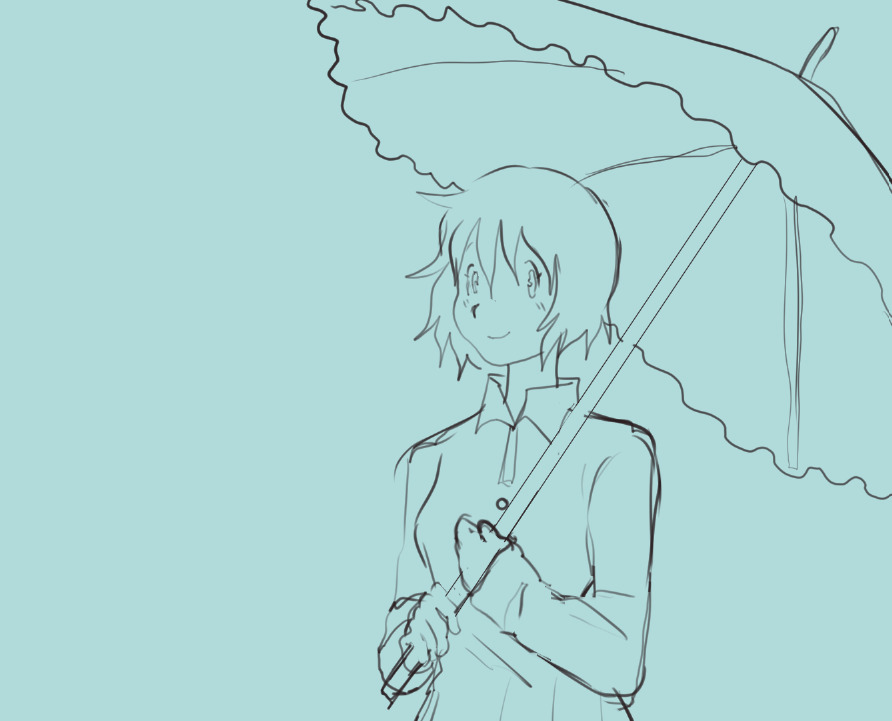Welcome to the NHK -- a tentative first try with nothing really serious to say
3/9/2023
wow, this will be my first time writing for my zonelets diary! though my side of the site is in shambles and i should be doing that instead of diary entries, and i’m very behind on my schoolwork and personal projects, and i should probably be working on other things…this week i decided on a whim to start “welcome to the NHK” instead and before i even realized what had happened, i had finished it over the course of only 5 or 6 days. this is unprecedented speed for me! as recently as earlier this year (i think i finished it in late january) i spent some time watching a show of similar length, dennou coil, and it took me almost a month to get through. there are some personal factors mediating that, of course, but i think interrogating the things about this show that created that unique effect will be fun too.

“welcome to the NHK” has oft been listed among other “quintessential psychological anime titles,” like your NGEs and your Death Notes and such – ive been aware of it for a long time, in fact i have a distinct memory of listening to puru puru puruin when i was like, 12 years old for some reason, though i think i thought it was from yowamushi pedal at the time (no idea how i came to that conclusion dont ask. does anyone even remember yowamushi pedal? remember when everyone was really into sports anime?!?! it feels like a lifetime away now..) i’d say its a shame i didn’t end up watching it when i was first made aware of it, but i’m glad i finally took the time to give it a watch now, because it’s never been more relevant to me than this specific time of my life, where i’m living a lifestyle i’d describe as “hikki-ish”, as in, i leave my house when i have to but absolutely never when i don’t, and am living completely on my own for the first time. though i’m not a NEET, the rhythm of my life looks very similar to satou’s at the moment. that’s why i decided to pick it up now, and probably why it resonated with me so well. (also, there’s boobs in this show!!!!!! no good for 12 year old coda.)
though i can’t say i left this show with a new lease on life, i can completely see how it would have that effect on people. if you’ve spent any amount of your life horrifically depressed and with utterly too much free time, starved for feel-good chemicals and isolated from humanity, i think you will find that “welcome to the NHK” does an excellent job portraying how ugly that experience can be without being condescending or cruel about it. i feel like writing about mental illness is often a balancing act between trying to carefully portray the issue in a way that doesn’t cast shame or judgment and speaking to the truth of how miserable and disruptive mental illness can be… in recent times, inclinations towards “respectful representation” has a lot of stories leaning really hard on the “no shame” side, at the cost of presenting an idealized version of “depressed” or “personality disordered” that rings really hollow. the bright side of watching an anime from 2006 is that that isn’t an area of concern here. the entire cast of this show is made up of terrible people with terrible lives, full of very mundane anguish. it’s very “relatable” in that sense – the characters aren’t limited by having to remain mostly likable because you’re going to hate some of them because they’re terrible people, and if you’re a terrible person or have ever felt like one, it’s pretty refreshing to see that kind of cast be treated empathetically while not compromising on how terrible they are. the constant slow moving train wreck of these characters’s lives really drives the unstoppable momentum of this show. i was glued to the screen and just like, so psyched to see the next exciting new way satou was going to ruin his life. they’re often cringeworthy, cataclysmically stupid, and very fun to watch – this is the kind of cast that can be entertaining in any scenario, so pretty much everything they do is at least a little compelling. a lot of great intrigue gets built up by presenting characters with extremely obvious problems and then not elaborating on precisely why they’re acting why they are for a good long while, so it feels a bit like putting together a puzzle to try to understand them (lol like the name of the op. Epic reference.) some of the characters, like satou’s enigmatic senpai whose first formal introduction to the regular cast sees her offering satou an assortment of dubious psychiatric medication with all the flippancy of asking if he’d like a mint, just never see an explanation – and maybe there isn’t one. she’s just kind of terrible, and in pain, just like everyone else. abandoning the linear “cause and effect” relationship of a lot of “stories about mental illness”, abandoning the pretense of good or bad, welcome to the NHK kind of just drops these people on your floor like its a cat that brought you a dead mouse. it’s just like… ewww, thanks! it’s a neat way to approach building a cast of characters. no one’s right, everyone’s wrong, everyone’s in pain and it doesn’t matter why, we’re all hurting each other, what do we do with that? i always like shows that are written like that.
as for the “main idea” at play here, it makes itself pretty clear in the last two episodes, and in misaki’s whole “deal.” welcome to the NHK is mostly concerned with “looking down on others,” as a natural human inclination and necessary function of society, tantamount to eating or breathing; what does that mean for both the person doing the looking-down and the person who’s being looked-down-on?what do those kind of relationships look like? someone taking advantage of you for your labor, affection, money, and reliance because you’re beneath them…how does that feel, and can a relationship like that become a real human connection? should it? how? i love those questions. the most interesting idea that it presented to me was the mutualistic relationship between misaki and satou – misaki, who looks down on satou by “taking care of him” since he is a “failure of a human” in her eyes in order to try to believe that she can have some kind of worth on this planet, and satou, who relies on her for companionship and survival when his few other relationships are destabilized and destroyed. though neither of them is participating in the relationship for “good reasons,” though they’re both self-serving and taking advantage of the other, they’re both able to benefit, and establish a shaky and dubious but consistent foundation on which they can live and sustain eachother. i really love that idea, i think it’s beautiful.
the other most interesting idea this show left with me is the natural conclusion of the “looking down on others” framework: if humans must look down on eachother to live, who does the person at the absolute bottom of that ladder look down on? i wont spoil it in explicit detail, but the final episode where this is really contested with was what resonated with me the most in the entire show. the answer to the question doesn’t involve doubling back on the harsh moral stance of the thesis, which is a direction the writing COULD have gone; ostensibly, it’s just “whatever they can.” i was really moved by it. “the utility of delusion for survival” and “the gift of escaping to a fantasy world when reality is too painful to live with” are two really important sentiments in my life and my own story writing, so to see them portrayed so beautifully here was something i wont forget. the scene of misaki and satou huddled together in her abandoned childhood home where she faced all that pain, in the dead of night, snow falling outside, two failed humans at the bottom of the food chain together, barely alive and feeding feebly off one anothers warmth…it really, really moved me. that’s all.

…and now onto my complaints! i think the strong thesis statement of the final two episodes was somewhat muddied by the sheer volume of other-things that the show had going on. this is personal preference because i like my stories very one track minded, but i think it would have felt more weighty with less episodes and less b-plots. the game creation subplot would have been way better if it were given more time and space! the plot about satou’s weird fucking relationship with hitomi would have been way better if it were given more time and space! maybe it is in the manga and or light novels who knows. in the show, most of what’s being presented comes off feeling like “great but could have been better” because of that. also, this show sure has a lot of hysterical women, huh? i’m a fan of hysterical women so it doesn’t bother me, but i think it occasionally runs the risk of vindicating yamazaki’s original incel-esque attitude at times, which is not fun (though this generally resolves itself so i wouldn’t call it broadly misogynistic or anything.) finally, jokes about characters being perverts are all well and good (i think pervert characters are so vitally important to society ) but i feel like a few decisions made about how exactly to go about that with satou specifically put a permanent dent in my rapport with him as a character very early on in the show and i wish they wouldn’t have been there because, even in a show about terrible people, certain things will really effectively erode an audience’s willingness to continue empathizing with them despite their terribleness (Like the jokes in question for me in particular) and that is really problematic for the way the show is received when it comes to attaching it to the protagonist, who we are ostensibly stuck with the entire time.
…and that’s really it! generally, my impression of this show was really good, i had a great time and i’m very glad i watched it. i think misaki has been added to a lower tier of my pantheon of favorite characters almost on-impact. i’d like to maybe write something more specific to her as a character sometime, because i think she’s a remarkable presence in the story and is ultimately kind of the glue that holds this whole thing together . she’s the most essential gear. and she’s an angel-type character, which may be biasing my opinion a little….another post for another time, lol.
ah..i ended up writing a lot, didn’t i? it was a lot of fun. this is generally what these are going to look like. i don’t really have any profound insights, but maybe you’ll enjoy reading them nonetheless! and, here are the quirks of this diary… with everything i watch, i try to pick a few favorite episodes, favorite characters, and any songs that i might have thought of when i was watching the show, since i am a very “amv-brained” person and love connecting stories to lyrics. so, here’s our very first instance of that!
Final rating: one million yen/10
Favorite episodes: 13 (Welcome to Paradise) 19 (Welcome to the Blue Bird) 20 (Welcome to the Winter Days) 24 (Welcome to the NHK)
Favorite characters: Misaki the best by far
Songs: 美ちなる方へ by Shinsei Kamattechan (Classic NEET recovery song, so it’s only natural…) Whatever Yama Says Goes by Pinocchio-P, Parannoul’s To See the Next Part of the Dream (though i’m biased because i knew this show was influential to this album…listening to white ceiling and recognizing the sample for the first time was funny enough i had to include it : ) )
and as a reward for getting this far, here's a quick drawing of misaki :)
